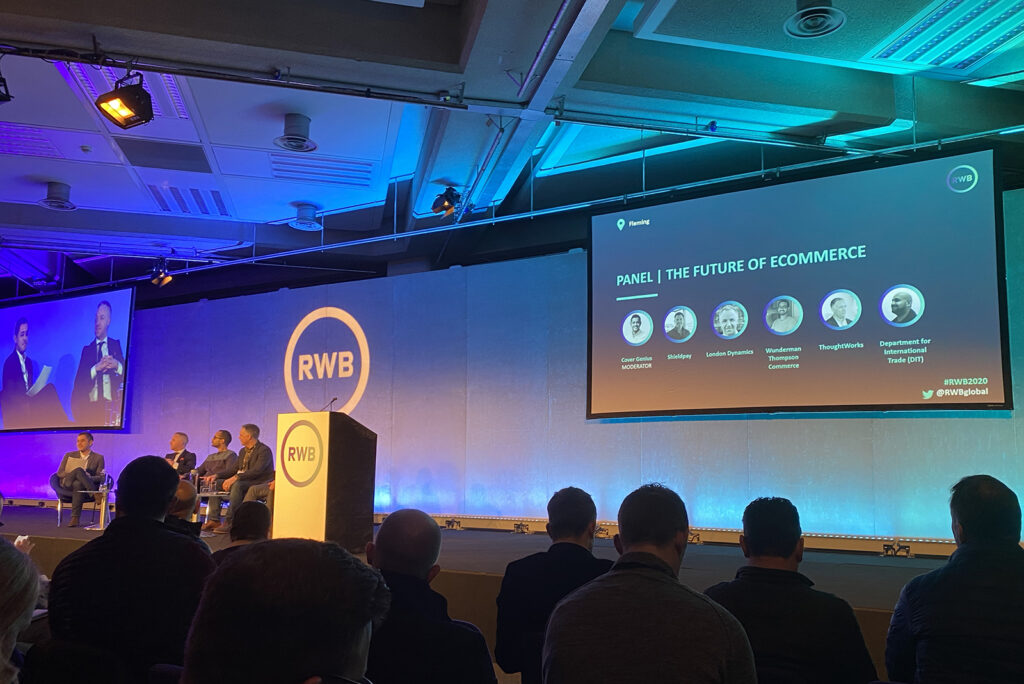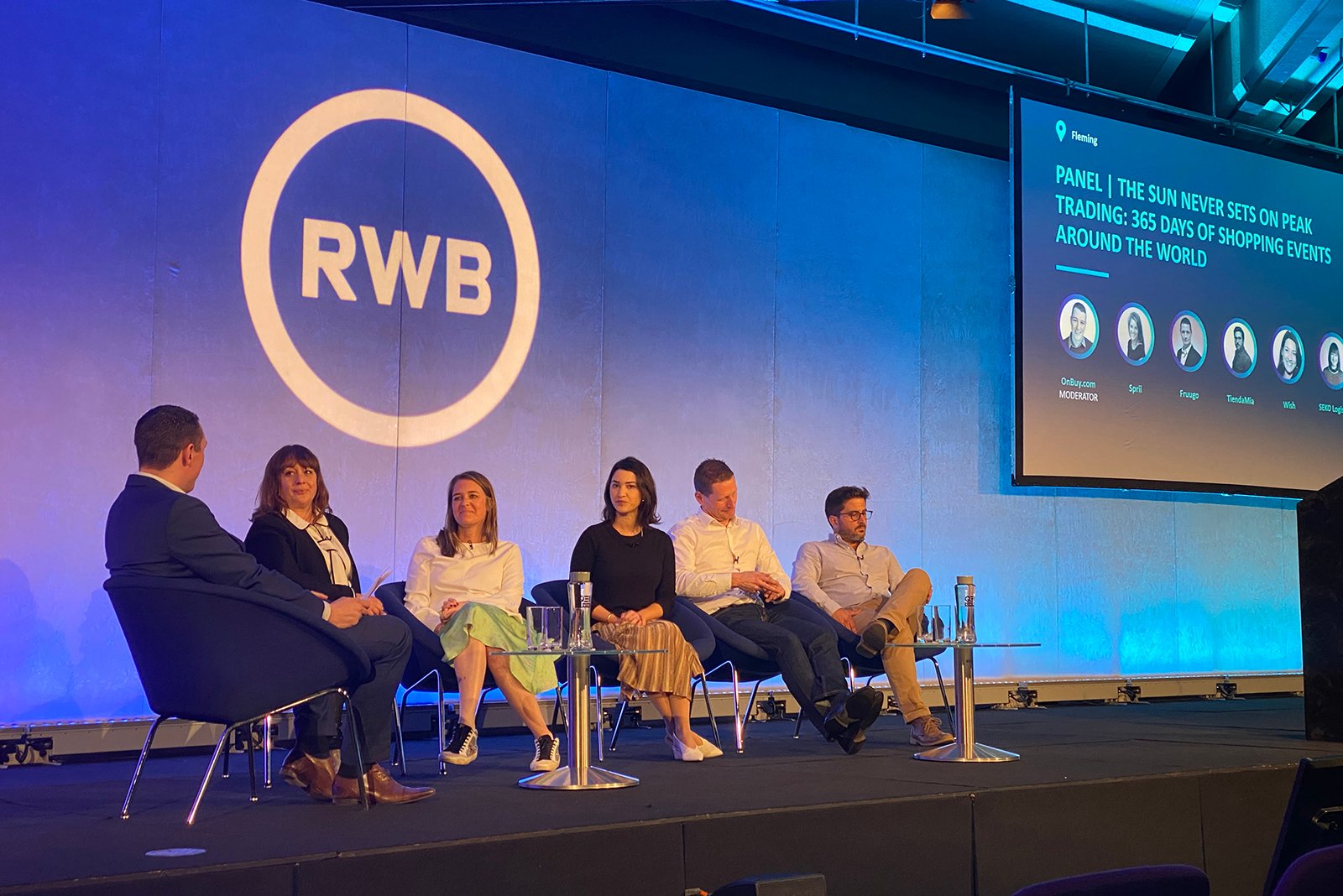Two days of thought leadership from eCommerce leaders at Europe’s largest online marketplace conference: Retail Without Borders. From Feb 27 – 28th 2020, at the Queen Elizabeth II Centre in London. With speakers from eBay, KPMG, Alibaba, Facebook, Wish and Fruugo.
Key Takeaways
- Ethical and Green Consumerism are hot topics right now.
- Physical stores are using online data to improve the in-store customer experience.
- Online Marketplaces have created an opportunity for retailers to export to under-served markets around the world.
- Choice, purpose and privacy are becoming increasingly important factors of the buying decision.
- Platform-based businesses have become the most valuable companies around the world.
Green Commerce

Kevin Flynn, director of Retail Strategy at Thoughtworks described Green Commerce as ‘the most disruptive trend of them all’ in 2020.
Consumer attitudes are changing and increasing numbers of people are making conscience-based buying decisions. With this increased interest in ethical and green commerce, big brands are adapting to serve the growing demand for green and ethical products.
New terms like ‘circular economy’, ‘sustainable fashion’ and ‘re-commerce’ have come about as retailers are becoming more responsible and consumers increasingly concerned with ecological integrity and social justice. Clothing marketplaces like FarFetch are incentivising customers to sell second-hand clothes and accessories, by offering credits towards future purchases from their marketplace.
Murray Lambell from eBay explained how multivendor marketplaces act as a barometer for consumer trends, with eBay seeing an increasing shift in demand for used, refurbished and returned items. This interest in not just in second-hand clothing but also electronics, home and garden products. With big brands like Dyson entering the ‘re-commerce’ market to widen their audience, this is a trend that’s set to get bigger.
Other examples of green commerce include increased adoption of recycled packaging and a variety of second-hand marketplaces springing up offering customisation and modification to clothing and other products.
Merging of Virtual and Physical Retail

Naji El-Arifi, head of innovation at Wunderman Thompson spoke about the reinvention of the retail experience. With physical stores like Amazon Go opening up, visible retail is still very much alive. This is a step up from traditional grocery shopping with a new generation of shops using online data to improve the results in physical stores.
This concept has been taken further in China, with grocery stores offering smart shopping carts that follow shoppers around the warehouse-style store giving them product information and recommendations on a digital screen as they shop.
With retail changing so rapidly, brands are struggling to keep up with the competition. Founder of London Dynamics, Michael Valdsgaard spoke about the need for retail stores to be innovative if they are to stay ahead of the competition. Giving Ikea as an example of a retailer using AI on its mobile app to allow consumers to visualise furniture in their home before buying.
Cross Border Opportunities

Countries like Australia and New Zealand have a large number of consumers wanting to buy fashion and beauty products online, but very few retailers in Australia are selling these products. With such a discrepancy between the demand and supply, multi-vendor marketplace providers Catch have capitalised on the situation by providing an opportunity for retailers in the UK and the rest of Europe to easily reach Australian consumers, by selling on their platform.
On a larger scale, Wish allows European sellers to sell cross-border to mobile consumers via their mobile shopping app. Wish product manager Katherine Sara spoke about their personalised shopping feeds and how vendors benefit from the large customer base Wish have built, and the marketing going out to these 500 million users. Aside from the ready-built user base, sellers also benefit from the warehousing and fulfilment services they offer.
Speakers from Catch, Wish and Fruugo provided insights on what it takes to tap into the growing International eCommerce industry. Selling on these cross-border marketplaces means access to their many loyal global shoppers as well as the benefits of their partnerships with global comparison search engines and their relationships with international affiliates.
Another advantage to sellers on these platforms is they’re usually whitelisted by Google Shopping in various countries around the world.
Choice, Purpose and Privacy

For many years the main factors driving a purchase decision (according to a study from KPMG) were price, convenience and the retail experience. These are still important, but as the world has become more complicated other important factors are influencing the buying decision. Choice, purpose and privacy.
Multi-vendor marketplace platforms and retailers offering more choice are prospering. Particularly those platforms offering a curated choice, where buyers are able to compare what’s on offer and make a choice based on various different needs or wants as well as factors like price.
More people are choosing to buy from organisations and platforms with a purpose. At the moment around 12% of consumers take purpose into consideration when choosing products. But, it’s believed that by 2030 50% of all consumption choices will be based on purpose. This is not just limited to environmental or ethical purpose but also social impact.
Platforms have the power to drive large-scale social change. From the way tech is designed, digital media consumed, and how data is used, there is a significant opportunity to positively impact individuals and society by improving health, education and digital inclusivity.
Privacy is also becoming more of a concern with consumers. People are switching companies or providers over data or data-sharing policies. So, there is an opportunity for brands to embrace data privacy.
What is the Future of eCommerce?
Platform-based businesses have become the most valued companies around the world. Most of today’s biggest IPOs and successful startups are platform businesses. Think Google, Facebook Amazon, eBay, Instagram, Slack, WhatsApp, Waze, Uber and Airbnb – these are all platform-based.
Marketplaces and the platform business model have been around for centuries. But now, due to advances in technology, platforms can facilitate the exchange of value produced by networks of individuals around the world. The result is that today’s platform businesses are able to facilitate exchanges at an unprecedented scale and this is a massive opportunity for all parties – buyers, sellers and platform business owners alike.
If you have an idea for an online marketplace of platform-based business, Code23 can turn this into a reality. Find out more about marketplace website development , WooCommerce or WordPress website development. Alternatively, contact us for a quote.
